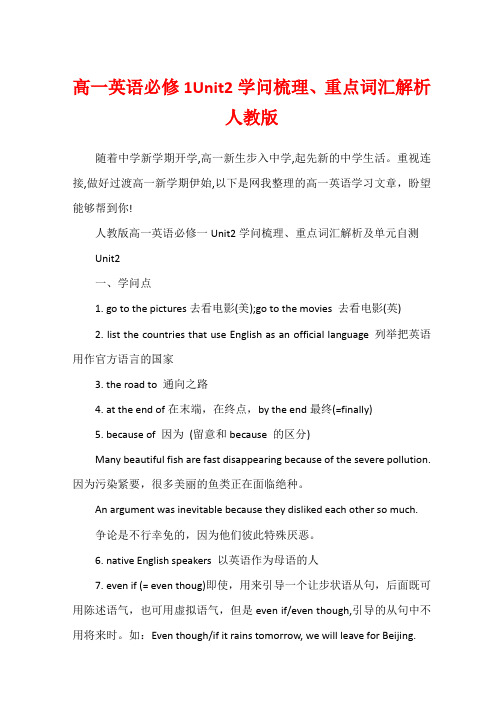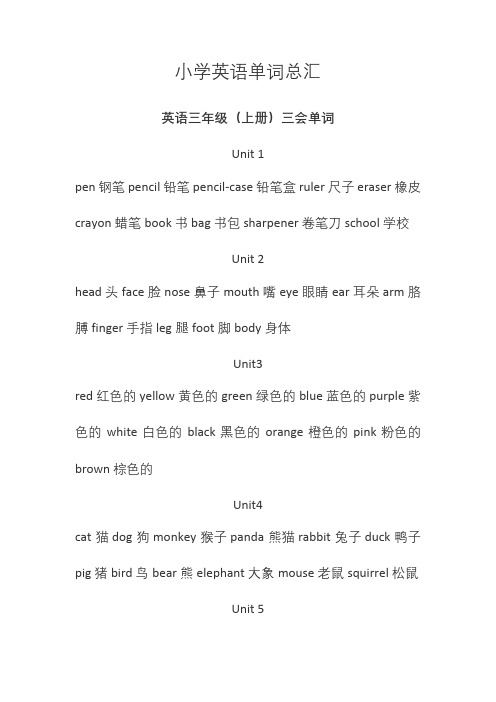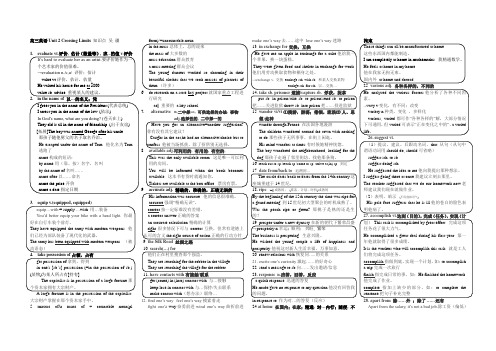unit2 Face[1]
新起点人教版一年级英语上册《Unit2_Lesson1_名师教案【辽宁沈阳】》

课题名称Unit2Face—Lesson1 课型New 教学对象一年级教者教学目标 1. Listen and say: face ear eye nose mouth2. Learn to use: one, two3. Learn to use: This is my …4. Listen and play games情感目标Have good habits to keep clean and protect eyes教学重点Say the words freely教学难点Use one and two correctly教学资源动画课件教材内容分析和学习者特征分析一年级学生刚刚接触英语这门学科,学生有很强烈的好奇心和模仿能力。
通过听,说,读,唱,做,游戏等多种活动认识五官单词,运用对比方式让孩子们养成讲卫生,爱护眼睛的好习惯。
教学过程教学环节教师活动学生活动设计意图及资源准备一.Warm up 1. Greet together: say“Hello” to each other Sing withteacher.Sing together.唱歌调节气氛,为新课学习做铺垫。
二. Lead in and presentation 2. Listen to a song aboutfive senses. Lead into thenew lesson: Unit 2 Face---Lesson11. Learn the word: faceT: What’s this?Ss: A face.T: Yes, this is my face.Face, face. Look, a dirtyface and a clean face.Read one byone: facePoint and say:a clean faceS: OK!通过dirty与clean的对比,让讲卫生深入Which do you like?T: Great! We should keep our face clean every day! OK?2. Learn the word: ear T: This is an ear. One ear, two ears. This is my ear. Look! The hippo has small ears, the rabbit has long ears, the elephant has the biggest ears in the world. They are just like two fans. We can hear with our ears.3. Learn to say: eyeT: face-ear-eye! We have two black eyes, but some people have blue eyes. We can see the beautiful world, the wonderful world, and the colorful world. They are very important, so we must protect our eyes, we should do eye exercises on time at school. Right?4. Learn: noseT: What’s it here? It’s a nose. I have one nose. What about you? What can we do with the nose? We can smell with it. Look, the Say and point:one ear, twoearsRead: ear oneear, two earsSay together:eyeS: Yes!Listen andshowS: NoseLearn to say:This is mynose.学生意识。
高一英语必修1Unit2知识梳理、重点词汇解析人教版

高一英语必修1Unit2学问梳理、重点词汇解析人教版随着中学新学期开学,高一新生步入中学,起先新的中学生活。
重视连接,做好过渡高一新学期伊始,以下是网我整理的高一英语学习文章,盼望能够帮到你!人教版高一英语必修一Unit2学问梳理、重点词汇解析及单元自测Unit2一、学问点1. go to the pictures去看电影(美);go to the movies 去看电影(英)2. list the countries that use English as an official language 列举把英语用作官方语言的国家3. the road to 通向之路4. at the end of在末端,在终点,by the end最终(=finally)5. because of 因为(留意和because 的区分)Many beautiful fish are fast disappearing because of the severe pollution.因为污染紧要,很多美丽的鱼类正在面临绝种。
An argument was inevitable because they disliked each other so much.争论是不行幸免的,因为他们彼此特殊厌恶。
6. native English speakers 以英语作为母语的人7. even if (= even thoug)即使,用来引导一个让步状语从句,后面既可用陈述语气,也可用虚拟语气,但是even if/even though,引导的从句中不用将来时。
如:Even though/if it rains tomorrow, we will leave for Beijing.8. come up 走上前来,走近,发生,出现come up with 追上,赶上,提出9. Actually all languages change and develop when cultures meet and communicate with each other.事实上,当不同文化相互沟通渗透时,全部的语言都会有所开展、有所变更。
(完整版)小学英语所有单词1

小学英语单词总汇英语三年级(上册)三会单词Unit 1pen 钢笔 pencil 铅笔 pencil-case 铅笔盒 ruler 尺子 eraser 橡皮crayon 蜡笔book 书 bag 书包 sharpener 卷笔刀 school 学校Unit 2head 头face 脸nose 鼻子mouth 嘴eye 眼睛ear 耳朵arm 胳膊finger 手指 leg腿foot 脚body 身体Unit3red 红色的yellow 黄色的green 绿色的blue 蓝色的 purple 紫色的white 白色的black 黑色的orange 橙色的pink 粉色的brown 棕色的Unit4cat 猫dog 狗monkey 猴子panda 熊猫rabbit 兔子duck 鸭子pig 猪bird 鸟bear 熊elephant 大象mouse 老鼠squirrel 松鼠Unit 5cake 蛋糕bread 面包hot dog 热狗hamburger 汉堡包chicken 鸡肉 French fries 榨薯条Coke 可乐juice 果汁milk 牛奶water 水tea 茶coffee 咖啡Unit 6one 一two 二three 三four 四five 五six 六seven 七eight 八nine 九ten 十doll 玩具娃娃boat 小船ball 球kite 风筝 balloon 气球car 小汽车plane 飞机英语三年级(下册)三会单词Unit1boy 男孩 girl 女孩teacher 教师student 学生this 这个my 我的friend 朋友I’m=I am 我是nice 好的;愉快的good morning 早上好good afternoon 下午好meet 遇见;碰见goodbye 再见too 也;太Unit 2father 父亲;爸爸dad 爸爸(口语)mother 母亲;妈妈mom 妈妈(口语)man男人woman 女人grandmother (外)祖母grandma (口语)(外)祖母grandfather (外)祖父grandpa (口语)(外)祖父sister 姐妹brother 兄弟 let’s=let us 让我们great 太好了really 真地;确切地and 和;并且 how 多么;怎么样Unit 3eleven 十一twelve 十二thirteen 十三fourteen 十四fifteen 十五sixteen 十六seventeen 十七eighteen 十八nineteen 十九twenty 二十how many 多少can 能够;可以look at 看;瞧Unit 4peach 桃pear 梨orange 橙子watermelon 西瓜apple 苹果banana 香蕉strawberry 草莓grape 葡萄like 喜欢some 一些;某些thanks 多谢Unit 5bus 公共汽车bike 自行车taxi 出租车jeep 吉普车desk 课桌chair 椅子walkman 随身听lamp 台灯your 你的;你们的 zoo动物园 Unit 6 small 小的big 大的long 长的short 短的;矮的tall 高的 giraffe 长颈鹿deer 鹿四年级上册四会单词词汇表Unit 1Window(窗户) board(板) light(灯) picture(图片) door(门) floor(地板) classroom (教室) computer(电脑) teacher’desk(讲台) wall(墙) fan(扇子)Unit 2bag(包) pencil(铅笔) pen(钢笔) book (书) ruler(尺子) pencil-case(铅笔盒)Unit 3teacher(教师) student(学生) boy(男孩) girl(女孩) friend(朋友)Unit 4home(家) room(房间) school(学校) classroom(教室) window(窗户) desk(课桌;书桌) door(门) chair(椅子) bed(床)Unit 5rice(米饭) beef(牛肉) bread(面包) milk(牛奶) egg(蛋) water(水) chicken(鸡肉) fish(鱼)Unit 6sister(姐妹) brother(兄弟) father(父亲;爸爸) mother(母亲;妈妈) driver(司机) doctor(医生) farmer(农民) nurse(护士)四年级下册四会单词词汇表Unit 1computer(计算机) board(写字板) fan(风扇) light(灯) this(这;这个) is(是)my(我的) that(那;那个) your(你的) teacher’s desk(讲台) picture(图画;照片) wall(墙壁) floor(地板) yes(是;是的) it(它)Unit 2one(一) two(二) three(三) four(四) five(五) six(六) seven(七) eight(八) nine(九) ten(十) what(什么) time(时间) it’s=it is …o’clock(…点钟) math(数学) Chinese(语文) English(英语) P.E.(体育) music(音乐) for(为;给) class(课程)Unit 3jacket(夹克衫) shirt(衬衫) skirt(裙子) dress(连衣裙) T-shirt(T恤衫) red(红色的) blue(蓝色的) yellow(黄色的) green(绿色的) white(白色的) no(不;不是) not(不;不是的) colour(颜色)Unit 4warm(暖和的) cold(寒冷的) cool(凉爽的) today(今天) jeans(牛仔裤) pants(长裤) socks(袜子) shoes(鞋子) let’s=let us play(玩;踢) football(足球) snowy(下雪的) sunny(晴朗的)Unit 5how much(多少钱) big(大的) small(小的) long(长的) short(短的) apple(苹果) banana(香蕉) pear(梨) orange(橙子) watermelon(西瓜) are(是) they它(他、她)们Unit 6horse(马) aren’t=are not cat(猫) rabbit(兔子) pig(猪) duck(鸭子) dog(狗) eleven(十一) twelve(十二) thirteen(十三) fifteen(十五) twenty(二十) how many(多少) there(那儿;那里)五年级上册四会单词词汇表Unit 1Young(年轻的)funny(滑稽可笑的)tall(高的)strong (强壮的)kind(和蔼的;亲切的)old(年老的)short (矮的)thin(瘦的)Mr(先生)like(像;喜欢)strict (严格的)smart(聪明的;巧妙的)active(积极的;活跃的)quiet(安静的;文静的)very(很;非常)but(但是)Unit 2Monday(星期一)Tuesday(星期二)Wednesday(星期三)Thursday(星期四)Friday(星期五)Saturday(星期六)Sunday(星期天)day(天;日子)have(有;吃)on (在…..时候)do homework(做作业)watch TV(看电视)read books(读书)Unit 3eggplant(茄子)fish(鱼)green beans(青豆)tofu(豆腐)potato(土豆)tomato(西红柿)for(为;给)lunch(中餐;午饭)we(我们)tasty(好吃的)sweet(甜的)sour(酸的)fresh(新鲜的)salty(咸的)favourite(最喜爱的;特别喜爱的)they are(他们是)fruit(水果)grape(葡萄)Unit 4Cook the meals(倒垃圾)water the flowers(浇花)sweep the floor(扫地)clean the bedroom(打扫卧室)make the bed(铺床)set the table(摆饭桌)wash the clothes(洗碗碟)do the dishes(收拾衣服)use a computer(使用计算机)Unit 5curtain(空调)trash bin(垃圾箱)closet(壁橱)mirror (镜子)end table(床头柜)bedroom(卧室)kitchen(厨房)bathroom(卫生间)living room(客厅)in(在…里面)on(在…上面)under(在…下面)near(在..旁边)behind (在…后边)clothes(衣服)Unit 6river(河流)flower(花)grass(草)lake(湖泊)forest (森林)path(路)park(公园)picture(照片)house (房子)bridge(桥)tree(树)road(公路)building(建筑物)clean(干净的)Unit 1do morning exercises(晨练)eat breakfast(吃早饭)have English class(上英语课)play sports(进行体育运动)eat dinner(吃晚饭)when(什么时候)evening(夜晚;晚上)get up(起床)at(在…点钟)usually(通常;一般)noon (中午)climb mountains(爬山)go shopping(购物;买东西)play the piano(弹钢琴)visit grandparents(看望祖父母)go hiking(去远足)weekend(周末)often(经常)sometimes(有时候)Unit 2spring(春天)summer(夏天)fall(秋天)winter(冬天)season季节)which(哪一个)best(最;极)swim(游泳)fly kites(放风筝)skate(滑冰;滑冰鞋)make a snowman (堆雪人)plant trees(种树)why(为什么)because(因为)sleep(睡觉)Unit 3Jan./January(一月)Feb./February(二月)Mar./March(三月)Apr./April(四月)May(五月)June(六月)July(七月)Aug./August(八月)Sept./September(九月)Oct./October(十月)Nov./November(十一月)Dec./December(十二月)birthday(生日)uncle(叔叔;舅舅)her(她的)date(日期)Unit 4aw pictures(画画)cook dinner(做饭)read a book(看书)answer the phone(接电话)listen to music9(听音乐)clean the room(打扫房间)write a letter(写信)write an e-mail (写电子邮件)mom(妈妈)grandpa(爷爷;外公)study (书房)Unit 5fly(飞)jump(跳)walk(走)run(跑)swim(游泳)kangaroo(袋鼠)sleep(睡觉)climb(往上爬)fight(打架)swing(荡;荡秋千)drink water(喝水)Unit 6 take pictures(照相)watch insects(观察昆虫)pick up leaves (采摘树叶)do an experiment(做实验)catch butterfly (捉蝴蝶)honey(蜂蜜)count insects(数昆虫)collectleaves(收集树叶)write a report(写报告)play chess(下棋)have a picnic(举行野餐)六年级上册四会单词词汇表Unit 1by (经,乘) foot(脚) bike(自行车) bus(公共汽车) train(火车) how(怎样) go to school(上学)traffic(交通)traffic light (交通灯)traffic rule(交通规则)stop(停,停车站)wait (等待)get to(到达)Unit 2library(图书馆) post office(邮局) hospital(医院) cinema(电影院) turn(转弯) bookstore(书店) where(在哪里,到哪里) please(请) next to(与…相邻) right (右边) left(左边) straight(成直线地) then (然后)Unit 3next week(下周) this morning(今天上午) this afternoon(今天下午) this evening (今天晚上) comic book(漫画书) post card(明信片) newspaper(报纸) buy(购买)Unit 4hobby(爱好) ride a bike--riding a bike(骑自行车) dive--diving(跳水) play the violin—playing the violin(拉小提琴) make kites—making kites(制作风筝) collect stamps—collecting stamps(集邮) live –lives(居住) teach--teaches(教) go--goes(去) watch--watches(看) read--reads(读,看) does doesn’t=does notUnit 5singer(歌唱家,歌手) writer(作家) actor(男演员) actress(女演员) artist(画家) TV reporter(电视台记者) engineer(工程师) accountant(会计) policeman(男警察) salesperson(销售员) cleaner(清洁工) where(在哪里,到哪里)work(工作)Unit 6rain(雨) cloud (云) sun(太阳) stream(河,溪) come from(来自,从…来) seed(种子) soil(土壤) sprout (苗,芽) plant(植物,种植) should (应该) then(然后)六年级下册四会单词词汇表Unit 1tall—taller更高的short—shorter更矮的strong—stronger更强壮的old—older年龄更大的young—younger更年轻的big—bigger更大的heavy—heavier更重的long—longer更长的thin—thinner更瘦的small—smaller(体型)更小的Unit 2have a fever发烧have a sore throat喉咙疼have a cold感冒have a toothache牙疼have a headache头疼matter事情,麻烦sore疼的hurt疼痛nose鼻子tired疲劳的,累的excited 兴奋的angry生气的happy高兴的bored无聊的,烦人的sad 忧伤的,悲伤的Unit 3watch—watched看wash—washed洗clean—cleaned打扫play—played玩visit—visited看望do—did做、干last weekend上一个周末go—went去go to a park—went to a park 去公园go swimming—went swimming去游泳go fishing—went fishing去钓鱼read—read读go hiking—went hiking去远足Unit 4learn Chinese—learned Chinese学汉语sing and dance—sang and danced唱歌和跳舞eat good food—ate good food吃好吃的食物take pictures—took pictures照相climb—climbed爬have—had有、拥有buy presents—bought presents买礼物row a boat—rowed a boat划船see elephant—saw elephant看大象go skiing—went skiing去滑雪go ice-skating—went ice-skating去滑冰how怎么,如何get—got到达last上一个的,仅余的,留在最后的小学英语单词大全一.学习用品(school things)钢笔pen铅笔pencil铅笔盒pencil-case尺子ruler书book书包schoolbag 漫画书comic book明信片postcard报纸newspaper包bag橡皮eraser蜡笔crayon 卷笔刀sharpener 故事书story-book笔记本notebook 语文书Chinese book英语书English book数学书math book杂志magazine词典dictionary二.人体(body)脚foot头head脸face头发hair鼻子nose嘴mouth眼睛eye耳朵ear手臂arm手hand手指hand腿leg尾巴tail身体body三.颜色(color)红red 蓝blue 黄yellow 绿green 白white 黑black 粉红pink 紫purple 橙orange 棕brown 灰grey四.动物(animals)猫cat 狗dog 猪pig 鸭duck 兔rabbit马horse 大象elephant蚂蚁ant鱼fish鹰eagle鹿deer 海狸beaver 鸟bird蛇snake 老鼠mouse 松鼠squirrel熊bear 袋鼠kangaroo 猴monkey 熊猫panda 狮子lion老虎tiger 狐狸fox斑马zebra长颈鹿giraffe鹅goose母鸡hen火鸡turkey小羊lamb 绵羊sheep山羊goat奶牛cow驴donkey鱿鱼squid龙虾lobster鲨鱼shark 海豹seal抹香鲸sperm whale虎鲸killer whale五.人物(people)朋友friend男孩boy女孩girl母亲mother父亲father 姐妹sister兄弟brother叔叔;舅舅uncle男人man女人woman先生Mr.小姐Miss女士lady妈妈mom爸爸dad父母parents(外)祖母grandma/grandmother(外)祖父grandpa/grandfather姑姑aunt儿子son婴儿baby堂(表)兄弟;堂(表)姐妹cousin小孩kid同学classmate 女王queen参观者visitor邻居neighbors校长principal 大学生university student笔友pen pal旅行者tourist人物people机器人robot六.职业(jobs)教师teacher学生student医生doctor护士nurse司机driver 农民farmer 歌唱家singer(男)警察policeman作家writer男演员actor女演员actress 画家artist电视台记者TV reporter工程师engineer会计accountant销售员salesperson清洁工cleaner棒球运动员baseball player售货员assistant (女)警察policewoman七.食品、饮料(food and drink)米饭rice面包bread牛肉beef牛奶milk水water蛋egg鱼fish豆腐tofu蛋糕cake热狗hot dog 猪肉pork汉堡包hamburger炸薯条French fries曲奇cookie饼干biscuit果酱jam面条noodle肉meat鸡肉chicken羊肉mutton蔬菜vegetable沙拉salad汤soup冰ice冰激凌ice-cream可乐Coke果汁juice茶tea咖啡coffee早餐breakfast午餐lunch晚餐dinner十八.星期( week )星期一Monday 星期二Tuesday 星期三Wednesday 星期四Thursday 星期五Friday 星期六Saturday星期日Sunday周末weekend十九.月份(months)一月份January (Jan.) 二月份February(Feb.) 三月份March(Mar.)四月份April (Apr)五月份May (May)六月份June(Jun) 七月份July(Jul) 八月份August(Aug.) 九月份September(Sept.) 十月份October(Oct.) 十一月November(Nov.) 十二月December(Dec.)二十.季节( seasons )春spring 夏summer 秋fall冬winter二十一.方位(directions)南south北north东east西west左边left右边right二十二.患病(illness)发烧have a fever 疼痛hurt 感冒have a cold 牙疼have a toothache 头疼have a headache 喉咙疼have a sore throat二十五.介词(prep.)在…里in 在…上;在…时候on 在…下面under 在…的旁边near 在…后边behind 与…相邻next to 在…上面over 在…前面infront of二十六.代词( pron. )我I 他he 她she 它it我们we 你;你们you 他(她,它)们they我的my 我们的our 你的;你们的your 他的his 她的her二十七.动词( v. )进行体育运动play sports玩;踢play打架fight 游泳swim滑冰skate爬山climb mountains放风筝fly kites跳舞dance唱歌sing画画draw弹钢琴play the piano晨练;做广播操do morning exercises去远足go hiking堆雪人make a snowman植树plant trees pictures浇花water the flowers照相take pictures 听音乐listen to music绘画paint去旅行take a trip 阅读杂志read a magazine集邮collect stamps下棋play chess驾驶drive飞fly跳jump走walk看look跑run爬climb荡swing划row踢kick骑ride 停stop等wait爱love尝taste闻smell剪shear放put折fold寄send买buy 卖sell 逛商店go shopping 吃eat 喝drink 有;吃have 像;喜欢like 帮助help转弯turn居住live带take 教teach 去go 挤奶milk 猜guess 反弹bounce回家go home 做家务do housework 睡觉sleep 上床睡觉go to bed 铺床make the bed 起床get up醒来wake up穿上put on脱掉take off挂起hang up穿wear洗 wash洗衣服wash the clothes 喝水drink water 洗碗do the dishes 打扫clean 扫地sweep the floor 打扫卧室clean the bedroom打扫房间clean the room倒垃圾empty the trash收拾衣服put away the clothes摆饭桌set the table做饭cook the meals做晚饭cook dinner吃早饭eat breakfast 吃晚饭eat dinner上学go to school上英语课have English class做作业do homework学习learn写信write a letter读书books看书read a book 写电子邮件writean e-mail 观察昆虫watch insects 读read 写write 看电视watch TV去看电影go to the cinema 思考think 使用计算机use the computer 玩电脑游戏play computers工作work 接电话answer the phone 看望(外)祖父母visit my grandparents 研究study见面meet欢迎welcome谢谢thank喂养feed传递pass展示show使用use打开open 关上close告诉tell寻找find照耀shine变成become感觉到feel 遇见meet 落下fall离开leave下车get off二十八.疑问词what(什么) when(什么时候) why(为什么) what color(什么颜色) what time(几点)what day(星期几) how old(年龄多大,几岁) how(怎样)how many(多少) how much (多少钱)how tall (多高) how heavy(多重) how long(多长) howbig(多大) how large(面积多大)where(在哪里) which(哪一个)who(谁) whose (谁的)二十九.be动词am is are was were三十.助动词do does did三十一.情态动词can should would will。
一年级上册英语教案-unit2Face6∣人教新起点

一年级上册英语教案unit 2 Face6∣人教新起点教学内容本单元主要围绕“面部特征”展开,教学内容包括认识并描述人的面部器官,如眼睛、鼻子、嘴巴、耳朵等。
学生将通过听、说、读、写等多种形式,学习和掌握与面部特征相关的英语单词和基本句型。
教学目标1. 能听懂并准确说出面部器官的英语单词,如eye、nose、mouth、ear等。
2. 能使用简单的英语句型来描述和识别面部器官。
3. 培养学生的观察能力和语言表达能力。
4. 增进学生对英语学习的兴趣和积极性。
教学难点1. 面部器官的英语单词发音和记忆。
2. 运用英语句型描述和识别面部器官。
教具学具准备1. 课件或黑板,用于展示面部器官的图片和单词。
2. 面部器官的实物模型或图片。
3. 录音机或音响设备,用于播放英语听力材料。
4. 学生手册和练习册。
教学过程1. 导入:通过展示面部器官的图片,引导学生说出它们的名称,激发学生的兴趣。
2. 新课内容:教授面部器官的英语单词和句型,通过图片、实物模型和动作表演等方式,帮助学生理解和记忆。
3. 练习:进行听力、口语和写作练习,巩固所学知识。
4. 应用:组织学生进行角色扮演或小组活动,运用所学英语描述和识别面部器官。
板书设计1. 在黑板上绘制面部器官的简笔画,并标注相应的英语单词。
2. 列出本节课的重点句型,并进行示例。
3. 用不同颜色的粉笔区分不同类型的单词和句型,以便学生识别和记忆。
作业设计1. 听力练习:听录音,选择与面部器官相关的英语单词。
2. 口语练习:与同学或家人进行角色扮演,描述和识别面部器官。
3. 写作练习:根据所给图片,写出与面部器官相关的英语句子。
课后反思通过本节课的教学,学生对面部器官的英语单词和句型有了基本的认识和掌握。
在教学过程中,我注重了学生的参与和实践,通过图片、实物模型和动作表演等方式,帮助学生理解和记忆所学知识。
同时,我也发现一些学生在发音和记忆单词方面存在困难,需要进一步加强练习和指导。
2020年高考复习:人教版高三英语unit2知识点

高三英语Unit 2 Crossing Limits 知识点 吴 疆A large fortune is in the possession of the capitalist. 大宗财产掌握在那个资本家手中。
5. masses of/a mass of + countable noun(pl6. do research on a state key project 就国家重点工程进行研究adj 重要的 a key school7. alternative n.二中择一, 可供选择的办法, 事物8.9. the Silk Road 丝绸之路 12. find one’s way feel one’s way 摸索着走 fight one’s way 奋勇前进 wind one’s way 曲折前进 make one’s way 去……途中 lose one’s way 迷路15. wander vi/vt ⑴漫游,游荡;徘徊,流浪⑵(人、思 reach out to sp./reach sp./come to sp. arrive at(in) sp. 到达 追溯到…20. renew relations with 恢复同…..的关系 21. excite one’s curiosity 激起……的好奇心 22. send a message to sb.向……发出邀请/信息 in response to 作为对…的答复(反应) 24.at home 在国内;在家;精通, 对…内行;随便, 不拘束28. apart from 除……外 ;除了 ……还有Apart from the salary, it’s not a bad job.除工资(偏低)归纳拓展:apart from,in addition(to),besides,as well(as),except for,except,butrise vi.升起,上涨;raise vt.举起,提高,提升,提出;饲养(羊、鸡等),抚养(子女等),招募(军队等),募捐(钱等)。
仁爱版七年级上 Unit2Topic1 2知识梳理

U2 T2 知识梳理
Part1 单词回顾
• 颜色类单词:
红色;橙色;黄色;金黄色;绿色;灰色;黑色;粉红色;紫色;蓝色;棕 色;帽子;连衣裙;短裙;衬衣;大衣;裤子(两种);鞋子;手套
• 介词:
• of; at;like • 动词:
后面的宾格还是主格???
• 给;买;喜欢;想要 • 特殊名词(并写出复数)
6.a pair of 用法(考点;难点;易错点)
a pair of , this pair of , that pair of these pairs of , those pairs of
练习 This pair of shoes ___(be) black. That pair of shoes ___(be) black. These pairs of shoes ___(be) black. Those pairs of shoes ___(be) black. The shoes _____ (be) black. The three pairs of shoes _____(be) black.
用have,has 填1 空
1.We _____a nice house(房子). 2.Do you ____a pen? 3.Does she _____a knife? 4.You ____ beautiful looks. 5. Jim ____ two big eyes. 6. She and he_____ short hair.
1.He has small feet.(改为一般疑问句,并作出肯定回答) ______________________________________________ 2.I have a knife.(改为一般疑问句,并作出否定回答) ___________________________________________ 3.Lily has long hair.(改为一般疑问句,并作出肯定及否定回答) _________________________________________________ 4.Lily and Lucy have small ears.(改为一般疑问句,并作出肯定 及否定回答) ________________________________________________ 5.My sister has long legs,(改为一般疑问句) _____________________________________-
Unit2高频词汇知识点清单高中英语人教版选择性

新教材人教版英语选择性必修第一册UNIT 2UNIT 2高频词汇知识点清单UNIT 2 LOOKING INTO THE FUTURE目录高频词汇精讲1. persuade vt. 劝说;说服;使相信2. switch vt. 转换;交换vi. & vt. (使)改变;转变n. 开关;转换器;改变3. preference n. 爱好;偏爱;偏爱的事物4. mand n. 指令;命令;控制;掌握vt. 命令;控制5. warning n. 警告;警示;先兆6. relevant adj. 有关的,切题的;有价值的,有意义的7. available adj. 可获得的;可购得的;可找到的;(人)有空的8. in this sense/in. . . sense从这种/某种意义上来讲9. bine v. (使)结合;混合;兼有;合并;同时做10. oppose vt. 反对;抵制;阻挠;竞争11. absence n. 不存在;缺乏;缺席12. potential adj. 可能的;潜在的n. 潜力;可能性13. resist vi. & vt. 抵制;反抗;抵挡高频词汇积累结构1. the instant一……就……结构2. it will take/will be+时间段+before. . . 要过多久才会……结构3. make+形式宾语it+宾语补足语+真正的宾语将来进行时一、将来进行时的构成与形式二、将来进行时的主要用法三、将来进行时与一般将来时的区别高频词汇精讲1. persuade vt. 劝说;说服;使相信For example,the phrase in my opinion tells us that the passage is likely meant to persuade.例如,“在我看来”这个短语告诉我们这篇文章很可能意在说服(读者)。
(教材P14) 情景导学He then persuaded me to try/into trying ice hockey.然后他说服我去打冰球。
仁爱版七年级英语上册Unit2 Topic1 _课文重难点讲解

Unit2 Topic1 课文重难点讲解【1】I have a small nose, but he has a big one. 我长着小鼻子,但是他长着大鼻子。
1) 这里的have是实义动词,意为“拥有”,第三人称单数用has。
如:I have a nice knife.我有一个漂亮的小刀。
I don’t have a nice knife.我没有一个漂亮的小刀。
—Do you have a nice knife?你有一个漂亮的小刀吗?—Yes, I do./No, I don’t.是的,我有。
/不,我没有。
He has a pen.他有一支钢笔。
He doesn’t have a pen.他没有一支钢笔。
此句型还可以转换成主语(物)+be动词+形容词。
如:I have a small nose, but he has a big one.的同义句为:My nose is small, but his nose is big.我的鼻子小,但他的鼻子大。
2) one在这里作代词,用来替代已提及的或已知道的某个名词。
如:You have a long ruler, but Ann has a short one.你有一把长尺子,但安有一把短尺子。
【2】—Oh, I know. You are Kangkang.哦,我知道了,你是康康。
—Yes,you’re right.是的, 你是正确的。
(l) know 知道,了解,懂得,认识(2)right adj.正确的right在这里是形容词。
You are right.相当于That’s right.你是正确的(你说得对)。
【拓展】right n.右边反义词: left左边【3】Michael, who is your favorite actor? 迈克尔, 谁是你最喜欢的演员?favorite作形容词,意为“最喜欢的……”,相当于like …best。
